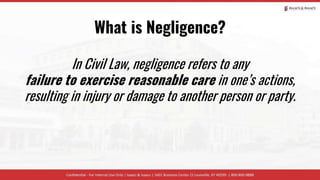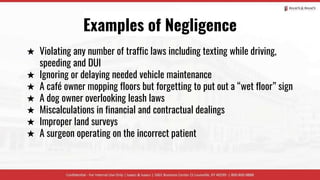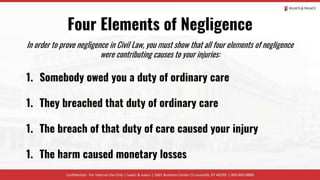What is Negligence?
- 2. What is Negligence? In Civil Law, negligence refers to any failure to exercise reasonable care in oneâs actions, resulting in injury or damage to another person or party.
- 3. Examples of Negligence â Violating any number of traffic laws including texting while driving, speeding and DUI â Ignoring or delaying needed vehicle maintenance â A cafÃĐ owner mopping floors but forgetting to put out a âwet floorâ sign â A dog owner overlooking leash laws â Miscalculations in financial and contractual dealings â Improper land surveys â A surgeon operating on the incorrect patient
- 4. Four Elements of Negligence In order to prove negligence in Civil Law, you must show that all four elements of negligence were contributing causes to your injuries: 1. Somebody owed you a duty of ordinary care 1. They breached that duty of ordinary care 1. The breach of that duty of care caused your injury 1. The harm caused monetary losses
- 5. FOR MORE INFORMATION ABOUT NEGLIGENCE & TRUCK ACCIDENT PREVENTION Visit www.isaacsandisaacs.com




